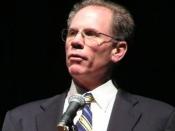Bias, as defined by the American Heritage Dictionary is ÃÂa preference or inclination, especially one that inhibits impartial judgment.àUsing this definition of bias as a lens for analysis, we will examine how bias affects the quality of media. The question that is the basis of the analysis is whether media that is biased can be ÃÂgood,àor whether the presence of any bias within media makes that media ÃÂbad.àSolutions to this question can be split into two camps: Bill Moyers and hRobert McChesney see bias as inhibiting the ability of media to inform; Jeffrey Jones and Henrik ÃÂrnebring and Anna Maria Jönsson think biased media can be ÃÂgoodàbecause they informs the public about alternative issues in unconventional ways.
In MoyersÃÂ article ÃÂJournalism and Democracy,ÃÂ published in The Nation, Moyers is explicit with his own personal biases: such as which presidents he enjoyed working under, and his opinions on what journalism should be.
However, he does agree that biased media in the public sphere cannot be good as it is inherently damaging to society. MoyersÃÂ view of media is best stated by this quote he uses from journalist Martha Gellhorn: ÃÂ ÃÂjournalism is a meansÃÂ the act of keeping the record straightÃÂ ÃÂ ÃÂ. This philosophy of ÃÂkeeping the record straightÃÂ or in other words, journalism as an unbiased and objective institution, is one that would not ÃÂinhibit impartial judgmentÃÂ.
Like McChesney, Moyers also believes that the success and unchecked power of commercial media conglomerates has led to the harmful effect of biased news coverage in American society. This bias in contemporary commercial media derives from a political system wherein, according to McChesney, ÃÂelites make [the] most fundamental political decisionsÃÂ (McChesney 3). Moyers provides the example of the late-nineties debate on the digital media spectrum; despite the nine...


